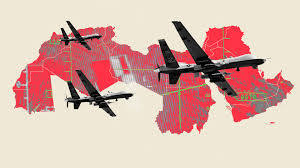Commerce, Justice, State and Treasury Issue Unprecedented Joint Advisory Concerning Iranian UAV Procurement Activities

Alex Cotoia, Regulatory Manager at The Volkov Law Group, rejoins us for a posting on new guidance concerning Iranian unmanned aerial vehicles (“UAVs”). Alex can be reached at [email protected].
In a relatively rare move for four (4) Cabinet-level Departments, the U.S. Departments of Commerce, Justice, State and Treasury issued an advisory notice on June 9, 2023, aimed specifically at reminding industry of their obligations vis-a-vis existing prohibitions in relation to dealings with Iran. The latest notice serves as a stark warning to industry that enhanced due diligence efforts, sufficient compliance structures, and robust internal controls are necessary to prevent the Iranian regime from acquiring specific components—largely of U.S. origin—necessary to assemble and export unmanned aerial vehicles (“UAVs”). The subject of UAVs has gained in importance, given the Iranian government’s ties to the Russian Federation and the widespread utilization of drones in connection with the ongoing Ukraine incursion.
As the advisory notice indicates, attempts by the Iranians to increase the development and distribution of UAVs have been primary goals of Tehran over at least the last decade. Beginning in August 2022, the Iranian regime has transferred hundreds of Shaed- and Mohajer-series UAVs to Russia, which in turn, has relied on the UAVs to carry out critical infrastructure attacks in connection with the brutal Ukrainian conflict. The recovery and dissection of UAVs from the battlefield reveals that certain functional components of Iranian-origin UAVs have been sourced largely from third-country suppliers that conceivably incorporate sub-components of U.S. origin.

As a result, Commerce’s Bureau of Industry and Security (“BIS”) has strengthened its existing export controls, by imposing additional licensing requirements on certain EAR99 commodities destined for Iran—irrespective of whether the transaction originates in the United States or involves a U.S. Person. In the context of the same rule, BIS specifically identified the components subject to the expanded requirements in a new Supplement No. 7 to Part 746, which includes certain engines, navigational equipment, and electronic components deemed integral to the manufacture and operation of Iranian-origin UAVs. BIS also promulgated a new Foreign Direct Product (“FDP”) rule specific to Iran that establishes EAR jurisdiction over foreign-produced items that are the direct product of U.S.-origin software or technology classified in Categories 3 through 5 and 7 of the Commerce Control List (“CCL”) or are produced by a plant or major component of a plant which itself is the direct product of such software or technology. The product scope of the new Iranian FDP rule also includes EAR99 items designated in Supplement No. 7.
BIS’s recent actions supplement longstanding sanctions regulations maintained by Treasury’s Office of Foreign Assets Control (“OFAC”) under the guise of the Iranian Transactions and Sanctions Regulations (31 C.F.R. Part 560). While the ITSR is notable principally for prohibiting most direct and indirect commercial, financial and trade transactions that implicate U.S. Persons or that occur within the United States, even non-U.S. Persons are prohibited from engaging in certain activities—including re-exporting from a third country, any goods, technologies or services originally exported from the United States with knowledge or belief that the re-export is intended specifically for Iran or the Government of Iran and that the item is subject to U.S. export licensing requirements. As the advisory notice highlights, this prohibition applies broadly to any foreign-made item that incorporates 10-percent or more U.S. controlled content by value.
The new advisory notice is intended to remind industry of their obligations under existing sanctions and export control laws by re-emphasizing the federal government’s “expectations” of companies to have effective and comprehensive compliance programs that are capable of detecting efforts by individuals or entities to evade or violate sanctions and export controls. The advisory notice has particular applicability to manufacturers, distributor, resellers, and freight forwarders involved in the product and distribution lifecycles of components—including, most ubiquitously, those listed in the aforementioned Supplement No. 7—that could be utilized by entities in foreign jurisdictions to manufacture more advanced components that are ultimately integrated into a final product by Iranian entities. To that end, the advisory notice underscores the need for companies to exercise “heighted caution” and conduct additional due diligence if a particular transaction or inquiry seems inconsistent with industry norms and practices or otherwise implicates an elevated risk of sanctions or export control evasion. Critical to the heightened vigilance required by companies that manufacture potential UAV components are the core compliance program requirements of continuous risk assessment, adjustment of internal controls, period testing, regular auditing and relevant training.

Finally, akin to the broader Tri-Seal Joint Compliance Notice issued by Commerce, Justice and Treasury earlier this year, the new advisory notice makes explicit reference to tactics typically employed by the Iranians (or others acting on their behalf) to surreptitiously acquire U.S.-origin commodities in connection with the production of UAVs. These tactics include, but are not limited to: (1) the use of corporate vehicles to obscure ownership, source of funds or countries/entities involved,particularly sanctioned jurisdictions or restricted entities; (2) reluctance to share information about the ultimate end-use of a product, including reticence or refusal to complete an end-user certification; (3) payment originating from a third-party country or business seemingly unconnected to the transaction in question; (4) transactions involving the use of freight-forwarding firms or similar services where the customer address is the same as the service utilized; and (5) transactions involving atypical shipping routes for the commodity in question or the routing of purchases through transshipment points commonly known to be utilized in connection with the diversion of restricted commodities to sanctioned jurisdictions.
As a practical matter, companies operating in industries known to provide products or services that are actually utilized or could potentially be utilized in connection with the assembly and production of UAVs by entities in Iran should scrupulously monitor commercial activity involving both prospective and existing customers in line with existing BIS KYC guidance. Continuous, automated screening of customers and contractual counterparties against current government sanctions lists is virtually a prerequisite for ensuring that more obvious violations are prevented. An additional critical component of sanctions and export compliance is obtaining end-user certifications that detail exactly how the commodity exported will be utilized by the ultimate consignee. Finally, overall awareness of methods utilized by the Iranians to conceal their procurement efforts—and geographic sensitivities by the organization—can all help to mitigate the potential that U.S.-origin commodities will be weaponized by the Iranians in support of malign foreign actors and repressive regimes.















